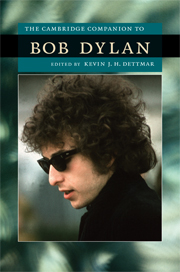Introduction
Published online by Cambridge University Press: 28 May 2009
Summary
No other figure from the world of American popular music, of this or any other era, has attracted the volume of critical attention, much of it quite original and perceptive, that Bob Dylan has. Just as significantly, no popular culture figure has ever been adopted into the curricula of college and university language and literature departments in the way Dylan has; critics have called James Joyce “God's gift to English departments,” but Dylan is no less deserving of that designation. As early as 1972, articles started appearing in scholarly journals analyzing the songs of Bob Dylan, using the methodologies of literary studies; perhaps more surprisingly, Scholastic Magazine, with its audience of secondary-school students and teachers, featured an article on Dylan back in 1970. Dylan biographer Clinton Heylin calls his oeuvre “the most important canon in rock music”; this praise may actually understate the case, for arguably Dylan's is the most important canon in all of twentieth-century American popular music. And Heylin's unembarrassed use of that politically charged term “canon” serves to suggest, too, that Dylan has long since passed into the Academy, making a Cambridge Companion to Bob Dylan a logical addition to this distinguished series. David Gates's description of Dylan as “the man who did to popular music what Einstein did to physics,” while initially sounding like hyperbole, really isn't (62). (The error, if there is one, isn't in the parallel between these two innovators, but in equating these fields of innovation.)
- Type
- Chapter
- Information
- The Cambridge Companion to Bob Dylan , pp. 1 - 12Publisher: Cambridge University PressPrint publication year: 2009



